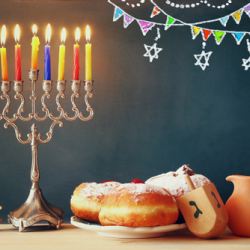
Chanukah Safety Tips
Chanukah will begin on December 24th and end on January 1st. It is that time of year, and Jeff Rossen will talk about fire safety around Christmas trees. Frankly, I am a bit jealous. Why no mention of the possible dangers in celebrating Chanukah? A few considerations.
Fires in December are most likely caused by cooking, but December is the month with the most fires caused by candles. Certainly, my tribal brothers and sisters are contributing to these figures. The flame from the menorah’s candles is a safety concern. You can set yourself or your house afire. So from a safety point of view, an electric menorah may be a better bet. But the more conservative members of the tribe feel that since the miracle (1) occurred with a menorah consisting of oil, wicks, and fire, we likewise should use the same type of lamp for the Chanukah menorah. For many, orthodox and conservative Jews there are issues concerning electricity as a religiously valid fuel source, and the light bulb may not be the necessary single flame. …Many are of the opinion that since electric lamps don’t really have any of these elements, one should not use them for Chanukah. If you choose to light the candles of a traditional menorah, fire safety is the key. ,
- Never leave a lit menorah unattended
- Place the menorah on a sturdy, nonflammable surface out of the reach of children and pets
- Keep the flames of the menorah away from flammable objects, like curtains or decorations
- Take the opportunity to test your smoke detectors (maybe having a readily available fire extinguisher is not such a bad idea for the klutzier amongst us)
Of greater importance is Latke safety. Care should be taken in grating potatoes and onions to avoid painful scrape injuries, the safest approach I have identified is to have another individual perform this function. Placing food in hot oil is another dangerous moment that can result in a nasty burn. While again the safe approach is to have a designated cook one must consider that the cook has an unfair advantage in being able to get the best Latke first. My compromise is to use a long-handled spoon when setting the Latkes in the oil. Finally, the mere ingestion of many, many latkes, and who after all can only eat one, can lead to gastrointestinal distress. The long-term effects on one’s health from latkes are both unknown and irrelevant. The traditional fat used in cooking, schmaltz (you will know it as chicken fat), has thankfully been replaced by more modern choices. A special shout out to The Atlantic for directing me to this historical tidbit:
“Crisco is Kosher. Rabbi Margolies of New York said that the Hebrew Race has been waiting 4,000 years for Crisco.”
Who knew? Another Chanukah food tradition, again in the fried segment of the food pyramid, is sufganiyot – fried dough. (To be perfectly honest, this is not something we had when I was growing up. Perhaps my mother felt that the heart attacking properties of schmalz was a sufficient health risk and did not want to further compound the issue.) The hot oil and digestive concerns apply here too. Burger King Israel is offering the SufaniKing – a Whopper with delicious doughnuts replacing the bun. Burger King Israel points to the Sufaniking as evidence “that miracles still happen."
Finally, pet safety is another Chanukah concern. Three tips to consider
- If sufganiyot do not give you any gastrointestinal distress, that might not be as true for your pets.
- Latkes contain onions, toxic to dogs where they cause anemia.
- Playing the game of Dreidel features two further pet hazards, first that they might try and eat the Dreidel itself (my dog would certainly take a run at it) and second, the foil wrapped chocolate coins are another toxic for dogs.
(1) "A tyrant king from Damascus had ruled over the Jews and forced them to worship Greek gods. Jewish rebels fought for their freedom for three years and, victorious, reclaimed the holy temple in Jerusalem. Now to rededicate the temple, they needed oil to light the menorah but they could only find enough to keep the flames burning for one night. And here's the miracle: The oil lasted for eight days. In that time, they were able to make more oil and keep the eternal flame lit." The Oil that Fueled the Hanukkah Miracle
